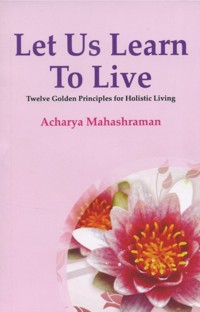Old age should not be feared as painful but viewed as a reward. It is a bouquet of experiences, a blessing of solitude, a time for relaxation, and a prospect of a new dawn of bliss. It is not a period of loneliness or the sad final chapter but a new sunrise with graceful and golden times ahead.
There are three stages of life: childhood, adulthood and old age. Old age is generally considered the period after age 70. Usually, a person sails with ease through the first two phases of life but tends to be apprehensive about old age. It need not be so! Old age is the time to relive and build upon past experiences gained through ups and downs, successes and failures, triumphs and defeats, trials and errors. There is no reason why this segment of life cannot be made as fruitful and happy a period as the first two stages. But for old age to be fulfilling, one must cultivate the right perspective, appropriate attitude and right habits.
Train Your Tongue
Food is essential for existence since it is the source of energy that sustains various bodily functions. However, poor eating habits or excessive food intake can hamper the ability to live a long and healthy life. Maintaining a balanced diet and keeping a gap between meals facilitates digestion. A controlled diet is also conducive to generating energy so a person can be mentally and physically fit. A lack of discipline, as manifested by overeating, may provide short-term pleasure to the taste buds, but can also lead to sickness. An unhealthy body results in accelerated aging and even premature death.
As we age, our body's systems change and so should our food habits. After the age of 40, the digestive system's functionality begins to gradually slow down, whereas the desire for relishing unhealthy foods may tend to increase. Such craving digresses one from a sensible and healthy diet. Disciplining the mind and curbing the taste buds is the first important step towards a healthy old age.
Control Your Emotions
The next major move for dignity in old age is gaining control over intense emotions. Although it is important to pacify emotions at every juncture in life it becomes crucial for the elderly. Ageing has a tendency to make most people sensitive and irritable. Their moodiness can distress not only to those around them but also themselves. People must learn to control their emotions and maintain equanimity from the very beginning. After all old age does not appear in one day but begins with birth and continues throughout the life cycle. The essential and invaluable practice of staying calm at all times can, therefore, never be overemphasized. No wonder, a person with a peaceful demeanor can endear himself or herself to all.
Choose Your Language
Old people are experienced and wise. They can provide valuable guidance by communicating their knowledge to others. Speech, as we all know, is the most common form of communication but as we age our method and manner of speaking is likely to change. There are two ways of communicating: injunction and suggestion. Everyone, especially the aged, should refrain from the former, since it is often offensive and can antagonize.
Take a common example of injunction: If a mother-in-law constantly inundates her daughter-in-law with the dos and don'ts, it is bound to breed irritation; ultimately the daughter-in-law ignores her. Such an undesirable outcome can be prevented by being polite and keeping conversations relevant and limited. It is advisable to use language and format that suggests rather than instructs. For example, she could say, "Would it not be better if we do it this way?" Using courteous words is constructive, and can effectively get the desired message across. It can transform even the most recalcitrant daughter-in-law or rebellious child into pleasant and compliant individuals. Harsh words, however logical they may be, can incite even a usually calm person and repeated over time will inevitably result in non-cooperation, a breakdown of the relationship, and eventually despair and loneliness. Mild language, on the other hand, soothes as well as sweetens the environment and helps cultivate cordial relationships with all age groups.
Enthusiasm is an age retardant. It can energize even an old physique. Passiveness, on the other hand, is detrimental to the body. It not only induces physical weakness but also promotes dependence. Old people who are frail can become burdensome to their kith and kin, as well as to themselves. Although the elderly should not be expected to carry out every possible physical activity, it is important to make an effort commensurate with their capability. Old age should not be an excuse. By engaging in reasonable and feasible activities senior citizens can certainly be an asset to society.
Cultivate Sanskars in the Next Generation
Introducing and nurturing good sanskars, culture and values in the next generation could be a rewarding assignment for the elderly. Since the parents are generally too busy with work and family affairs and have little or no time for their children, this important task is often neglected. If grandparents can take over this vital responsibility, it would benefit the entire family in at least three ways:
- Seniors will make good use of their time by keeping meaningfully occupied.
- The future generation would have the lasting positive advantages of a good upbringing and right values.
- The parents will be spared of the worry and even the guilt of not contributing enough to their children's development.
This context reminds me of the glorious King Louis IX of France. A popular and influential king, he credited his success entirely to his mother. When he was a child, his mother told him, "Never walk on the wrong path. I would rather see you as an ordinary but noble soul than a disgraced and dishonored king. I would rather see this throne empty than have it occupied by such a king, and rather see you dead than defamed." His mother's words sounded harsh but were, nevertheless, heartfelt. The child swore, "Mother, whether or not your son becomes the king, he will definitely be an honorable citizen of the country." The future king of France thus set his goal by his mother's wise counsel.
History cites innumerable examples of invaluable influence of the elderly on children. Beginning with ancient civilizations, the practice of instilling values in children was the responsibility of grandparents. But nowadays, grandparents hardly ever relate stories to their grandchildren! Media has taken over this job, and the dismal result has become apparent around the world. It is about time we restore this time tested tradition.There is a cautionary note, however: as the grandparents get actively involved in the noble task of fostering good sanskars in children, they must understand and reconcile with the generation gap and strike a delicate balance between tradition and changing times. Even if they find their advice falling on deaf ears, which is likely to happen every now and then, they should not get discouraged. It is common for youngsters to recall and appreciate their grandparents' words many years later. Grandparents, with their wisdom and experience, are definitely well equipped to plant the seeds of the right sanskars into the minds of their grandchildren.
Practice Preksha Dhyana (Meditation)
Old age does not mean that the need for continuing development or learning has ended! Instead, it is the time to meditate, or practice Preksha, which uplifts one's spirit and directs the energy towards spiritual growth. Preksha is a complete package of yoga and meditation. Preksha means visualization of one's true self through the self. Acharya Mahapragya says that visualizing your body revitalizes you physically, visualizing your mind keeps you in peace, visualizing your emotions purifies them, and a total comprehensive visualization of every aspect of life will allow you to reclaim your pure true self. Perception of breathing (Dirghashvasa Preksha) and total relaxation (Kayotsarg) can also help one feel always young.
These practices can lead to a peaceful, productive and contented period during one's old age. Understanding that aging is inevitable one must make a new beginning with awareness, resolution and effort.
 Acharya Mahashraman
Acharya Mahashraman

